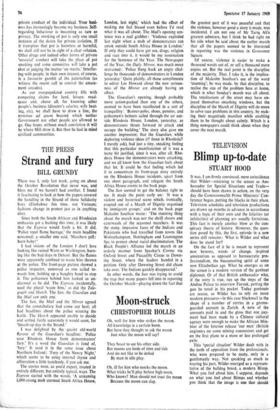Strand and fury
THE PRESS BILL GRUNDY
There was I, only last week, going on about the October Revolution that never was, and
bless me if we haven't had another. I found it fascinating to look at how the papers covered the handling in the Strand of those Solidarity boys (Zimbabwe this time, not Vietnam; fashions change in protest just as in anything else).
Since both the South African and Rhodesian embassies got a bashing this time, it was likely that the Express would froth a bit. It did. 'Police repel flame barrage,' the main headline screamed; a smaller one said, 'Marchers yell: burn baby!'
I had visions of the London I don't love looking like ruined Watts or Washington, burn- ing like the bad days in Detroit. But the flames were apparently confined to waste bins thrown at the police. The front-page picture showed a police inspector, unmoved as one sailed to- wards him, holding up a haughty hand to stop it. The policemen behind him looked as un- alarmed as he did. The Express, incidentally, used the plural 'waste bins,' as did the Tele- graph and Sketch. The Sun, the Guardian and the Mail saw only one.
The Sun, the Mail and the Mirror agreed that the constabulary had come out best; all had headlines about the police winning the battle. The Sketch appeared unable to decide and settled, fairly accurately it would seem, for 'Smash-up day in the Strand.'
I was delighted by the quaint old-world flavour of the Guardian's headline: 'Police save Rhodesia House from demonstrators' fury.' It's a word the Guardian is fond of, 'fury.' It used it in the same issue about Northern Ireland: 'Fury of the Newry Night,' which seems to be using internal rhyme and alliteration a little tastelessly, if you ask me.
The stories were, as you'd expect, treated in entirely different, but entirely typical, ways. The Express started with the words, 'A screaming 1,000-strong mob stormed South Africa House,
London, last night,' which bad the effect of making me feel biased even before I'd read
what it was all about. The Mail's opening sen- tence was a real grabber: 'Violence exploded last night when a mob of demonstrators ran amok outside South Africa House in London.' If only they could have got sex, drugs, religion and race into it, it would be my nomination for the Sentence of the Year. The Newspaper of the Year, the Daily Mirror, was much more restrained: 'Police flung back an angry chal- lenge by thousands of demonstrators in London yesterday.' Quite plainly, all those compliments to editor Lee Howard about the new serious- ness of the Mirror are already having an effect.
The Guardian's opening, though probably more action-packed than any of the others, seemed to have been recollected in a sort of tranquillity : `Banner-poles, shoes, pennies, and policemen's helmets sailed through the air out- side Rhodesia House, London, yesterday, as demonstrators thrust forward to attack and occupy the building.' The story also gave me another impression; that the Guardian, while deploring violence (does it? force in Rhodesia? I merely ask), had just a tiny, sneaking feeling that this particular manifestation of it was a teeny bit justified, since it was, after all, Rho- desia House the demonstrators were attacking, and we all know how the Guardian feels about that lot. It could be that feeling which led it to concentrate its front-page story entirely on the Rhodesia House incidents, apart from one short paragraph, and relegate the South Africa House events to the back page.
The Sun seemed to get the balance right to me. It made the point early on: It was a violent and hysterical scene which, ironically, erupted out of a March of Dignity organised by immigrant groups,' and on the back page Malcolm Southan wrote: 'The stunning thing about the march was not the shrill shouts and caterwauls of the seasoned marchers. It was the stony, impassive faces of the Indians and Pakistanis who had travelled from towns like Wolverhampton, Nottingham and Leamington Spa to protest about racial discrimination. The Black People's Alliance led the march in an orderly manner from Speaker's Corner via Oxford Street and Piccadilly Circus to Down- ing Street, where the leaders handed in a petition. Only after Downing Street did chaos take over. The Indians quickly disappeared.'- In other words, the Sun was trying to avoid the trap that many papers fell into in reporting the October March—playing down the fact that
the greatest part of it was peaceful and that the violence, however good a story it made, was incidental. I am not one of Mr Tang All's greatest admirers, but I think he had right on his side when he said about the earlier march that all the papers seemed to be interested in reporting was the violence in Grosvenor Square.
Of course, violence is easier to make a thousand words out of, or sell a thousand more copies on. But the real point is the discipline of the majority. That, I take it, is the implica- tion of Malcolm Southan's use of the word 'stunning': he was made, by that discipline, to realise the size of the problem here at home, which is what Sunday's march was all about. The totalitarians of the street may have en- joyed themselves smashing windows, but the discipline of the March of Dignity will do more to solve race problems in this country, by mak- ing their magnitude manifest while enabling them to be thought about calmly. Which is a thing newspapers could think about when they cover the next march.


































 Previous page
Previous page